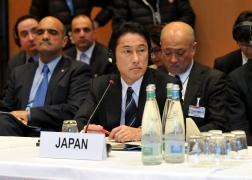Middle East
Foreign Minister Kishida's Attendance at the Geneva II Conference on Syria
(Outline and Evaluation)


1. Outline of Conference
(1) Fumio Kishida, Minister for Foreign Affairs of Japan, attended the International Conference on Syria(the Geneva II Conference) in Montreux, Switzerland, on January 22. The conference brought together Ban Ki-moon, Secretary-General of the United Nations, as host, and foreign ministers and representatives from 39 countries, including the United States, Russia, the United Kingdom, France, Germany, Italy, China and Arab nations, as well as international organizations. Minister for Foreign Affairs Walid al-Muallem represented the government of Syria, while Ahmad Al-Assi Al-Jarba, President of the National Coalition of Syrian Revolution and Opposition Forces, was among delegates from the Syrian opposition.
(i) U.N. Secretary-General Ban, chair of the conference, delivered the opening address, in which he called for the resolution of the issues in Syria based on the Geneva Communiqué, cessation to violence and immediate access of humanitarian assistance. The address was followed by remarks from Sergei Lavrov, Minister for Foreign Affairs of Russia, and John Kerry, Secretary of State of the United States. Minister Lavrov said the people of Syria should be left to decide their own future and called for dialogue where all Syrian people are properly represented. Secretary Kerry said the only option is a negotiated transition government, adding that Bashar Assad, President of Syria, who is responsible for violence against his own people, will not be part of the transition government.
(ii) Subsequently, Syrian Foreign Minister al-Muallem stressed that the Syrian government is fighting terrorists who are supported by foreign countries and stated that decisions regarding the ruler and constitution of Syria rest with no one else other than the people of Syria. Al-Jarba, President of the National Coalition, reaffirmed his coalition's full support for the Geneva Communiqué. Noting that the communiqué intends the resignation of President Assad, he said there is no room for negotiation.
(iii) Representatives of other participating countries and international organizations took turns to make statements. Minister Kishida said he believes the ultimate goal of the conference to “get back a beautiful Syria” and appealed for an immediate cessation of violence. In addition to humanitarian assistance amounting to some 280 million U.S. dollars that has been extended to Syria, including aid to neighboring countries, Japan plans to provide additional assistance worth 120 million dollars in total, he said. He also pledged Japanese efforts to build confidence among parties that agree to the Geneva Communiqué in order to facilitate its implementation, including the establishment of a transitional governing body. These initiatives, Minister Kishida said, show Japan's determination to provide both humanitarian assistance and contribute to political dialogue, in parallel, like the two wheels of a cart. The Japanese commitments were praised by U.N. and other countries and President Al-Jarba mentioned “getting back a beautiful Syria” in his closing remarks.
(2) Minister Kishida held bilateral meetings with Lakhdar Brahimi, Joint Special Representative for Syria of the United Nations and the League of Arab States, and Catherine Ashton, High Representative of the European Union (EU) for Foreign Affairs and Security Policy. He also spoke with other participants of the conference, including his counterparts. With the officials, Minister Kishida agreed to work together to improve the situation in Syria and reaffirmed cooperation in bilateral relations.
2. Evaluation
(1) For the first time since the deterioration of the situation in Syria, representatives of the Syrian government and the opposition sat down face to face for dialogue. The fact that foreign minister-level senior officials took part in the conference from the relevant countries and shared the belief that there is no other option but to explore a political solution to the situation in Syria, although there were differences in terms of approach to the administration of the current regime and assessment of the violence in Syria is an important message to the international community. It would be fair to say that the conference marked a significant step forward at a time when the difficult process of direct negotiations, for which no optimism is warranted, was about to begin.
(2) The participation of Minister Kishida at the conference, which brought together his counterparts from major countries such as the United States and Russia, was important in that he demonstrated once again Japan's position on and approach to the issue of Syria.
(3) On the sidelines of the conference, Minister Kishida held individual, in-depth talks with representatives of other countries and international organizations on regional situations, including the issue of Syria.

